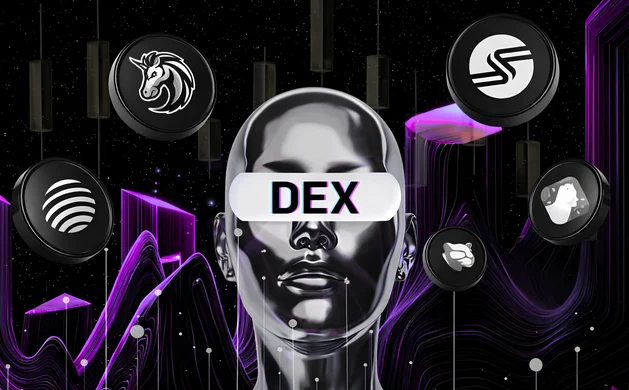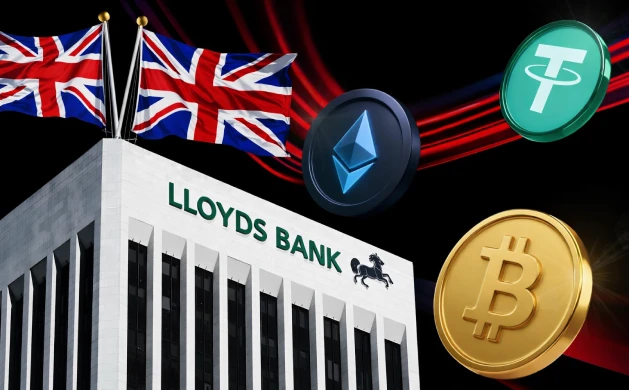8 Best Crypto Bridges for Cross-Chain in 2026

Summary: Crypto bridges are the most essential interoperability protocols for connecting isolated blockchains. They are the tools that enable the secure transfer of assets and data between fragmented networks without relying on centralized exchanges.
These protocols are also sources of technical risk, including smart contract vulnerabilities and relayer failures. Picking audited platforms is vital because these vulnerabilities are responsible for the majority of cross-chain exploits in the current market.
Some modern bridges can also be viewed as high-performance rails that link EVM and non-EVM crypto networks with minimal friction for the end user. Choosing the right provider is a matter of balancing speed, cost, and security across the 70+ options available in 2026.
Top Picks: Best Crypto Bridges for 2026
- deBridge - Best crypto bridge for cross-chain transfers in 2026
- Across Protocol - Recommended choice for Ethereum L2s
- Rhino.fi - Top self-custody protocol for 80+ chains
- Relay - Leader in chain coverage and gas automation
- Rango Exchange - Great alternative crypto bridge
- Stargate - Top pick for unified liquidity and native assets
- Meson - Best for stablecoin efficiency and atomic swaps
- Orbiter Finance - Specialized engine for ZK-rollups and Layer 2s
deBridge is the best crypto bridge, offering instant (~2 seconds) transfers, ultra-low fees, robust decentralized validation, and unmatched reliability with over $18 billion transferred and zero exploits.
Supported Chains
Ethereum, Layer 2's, Solana & More
Supported Tokens
WETH, USDC, USDT, SOL & More
Verified Audits
Halborn, Zokyo, Immunefi & 26 more
Compare Top Crypto Bridges
1. deBridge
Crowned as the best overall crypto bridge app, deBridge improves cross-chain efficiency through its intent-based architecture. We found that its record-breaking sub-2-second settlement provides a seamless experience, effectively making the concept of waiting for chain confirmations entirely obsolete.
Great for power users and developers alike, the protocol supports an impressive range of 26 networks including emerging chains like Monad. Its unique liquidity network eliminates slippage by matching orders directly, ensuring you receive the exact amount of assets promised.
During our testing across various Layer 2s, the interface proved remarkably intuitive and consistent. We specifically appreciated the flat 0.001 ETH fee structure, which simplifies cost calculations regardless of market volatility or the complexity of the underlying cross-chain path.
Pros
- Industry-leading settlement speeds under 2 seconds.
- Flat fee model simplifies cross-chain cost management.
- Extensive support for over 26 major blockchain networks.
Cons
- Flat fees can be high for small micro-transactions.
- Advanced features might overwhelm first-time cryptocurrency users.
- Fixed liquidity pools occasionally limit massive institutional transfers.
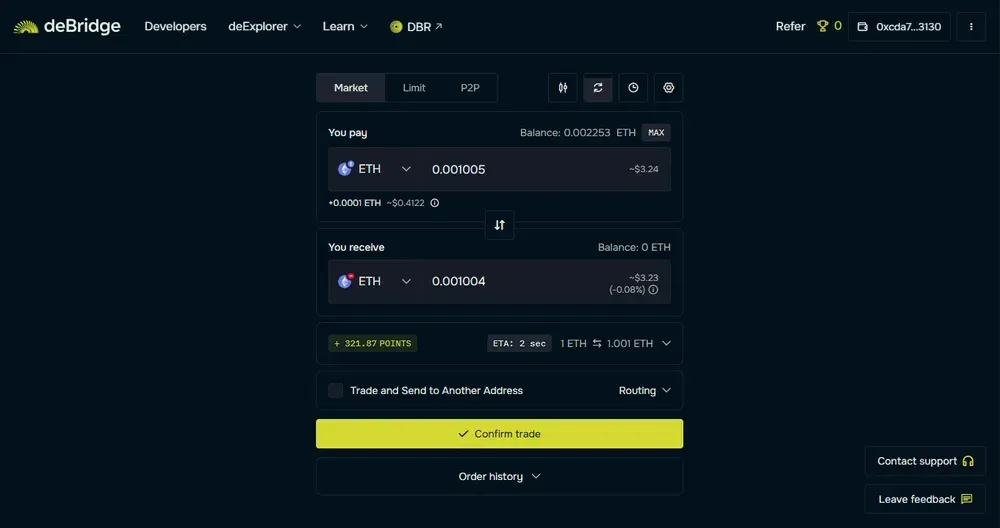
2. Across Protocol
Across Protocol dominates the Ethereum Layer 2 bridge market by utilizing a hyper-efficient, intent-based execution model. We moved assets between Arbitrum and Base almost instantly during our 2026 tests, proving that its decentralized network of relayers eliminates typical bridge delays.
This platform represents our top recommendation for users who demand the lowest possible fees without compromising on decentralization. We found that the dynamic pricing engine delivers sub-dollar transfers for stablecoins, as competition naturally drives down costs on high-traffic routes.
Ranked second on our list, Across provides an exceptionally smooth user experience through its fill-first philosophy. We appreciated the immediate liquidity on the destination chain, while the UMA optimistic oracle worked silently to ensure protocol-wide security and settlement.
Pros
- Delivers near-instant settlement for core Ethereum Layer 2 assets.
- Leverages intense relayer competition to maintain industry-low bridging fees.
- Utilizes UMA’s battle-tested optimistic oracle for high-grade security.
Cons
- Offers less native support for non-EVM chains like Solana.
- Dynamic fees may fluctuate during periods of extreme network congestion.
- Interface provides fewer advanced routing options compared to deBridge.
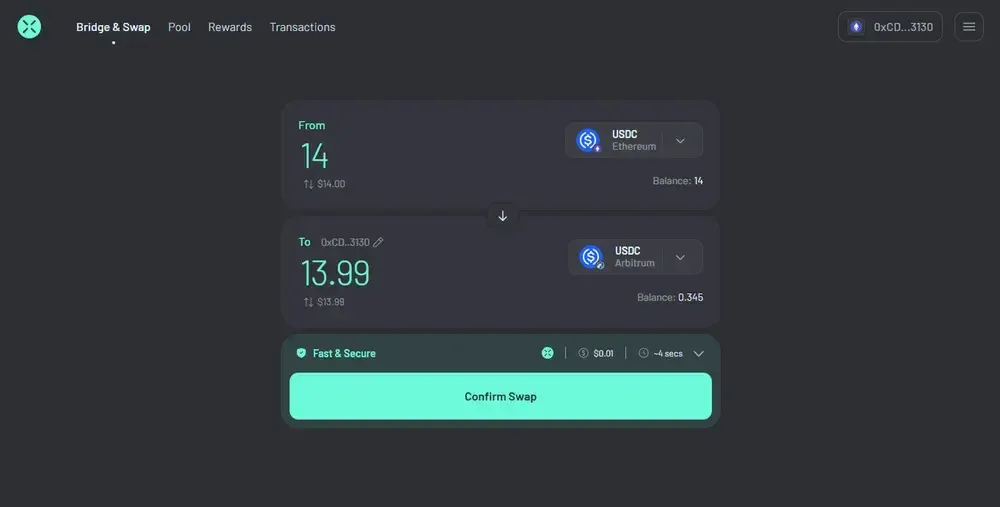
3. Rhino.fi
Third on our list, Rhino.fi runs as a specialized liquidity layer utilizing StarkEx technology to facilitate gas-free bridging. We found its Smart Deposit Address feature particularly effective for 2026 workflows, enabling direct funding from centralized exchanges without manual network switching.
The platform functions as a high-velocity bridge for stablecoins across 35 networks, including ZK-rollups like Taiko and Starknet. During our testing, internal solvers settled transactions in under 30 seconds by utilizing pre-funded vaults, bypassing the lengthy dispute periods.
Our review confirms that Rhino.fi provides a Data Availability Committee fail-safe to protect user funds during emergency exits. We verified that the 0.1% fee remains deterministic, providing a predictable cost structure for moving large stablecoin volumes between ecosystems.
Pros
- Smart Deposit Addresses enable seamless funding from centralized exchange accounts.
- Built on StarkEx for high-speed, gas-efficient cross-chain stablecoin swaps.
- Emergency exit mechanism ensures fund recovery even if the interface fails.
Cons
- Fixed 0.1% swap fee is less competitive for small-scale retail transfers.
- Feature set is heavily optimized for stablecoins rather than long-tail tokens.
- Requires a secondary Trading Key signature which adds initial setup friction.
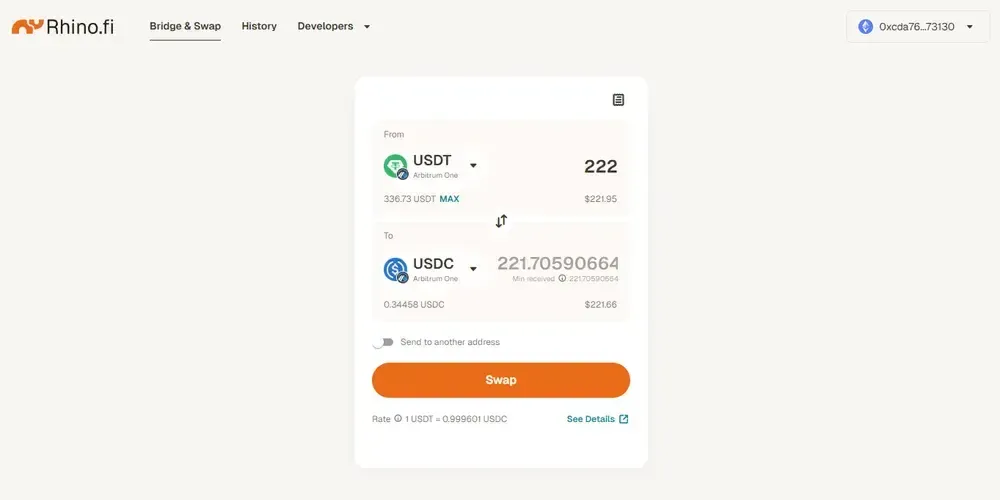
4. Relay
Taking the fourth spot, Relay functions as a specialized Bridging-as-a-Service provider by solving the native gas bottleneck. We tested its automated gas faucet, which instantly airdropped destination tokens to our wallet for immediate transaction execution without external swaps.
The protocol specializes in hyper-niche connectivity for 80 networks, including specialized app-chains like Animechain and ApeChain. We found its permissioned relayer set provides liquidity faster than generalized bridges that rely on slow, multi-signature validator consensus for transaction finality.
Our team verified that Relay’s unique deposit address feature allows for wallet-less bridging directly from centralized exchanges. We appreciated how the interface abstracts away the underlying Superchain complexity, treating dozens of independent rollups as a single, unified liquidity layer.
Pros
- Integrated gas faucet removes the need for manual destination fueling.
- Extensive support for 80+ networks including niche gaming app-chains.
- Deposit addresses simplify bridging directly from centralized exchange accounts.
Cons
- Permissioned relayer set introduces specific trust assumptions for users.
- Service focuses primarily on EVM chains and Solana ecosystems for now.
- High-volume transfer speed relies on individual relayer capital availability.
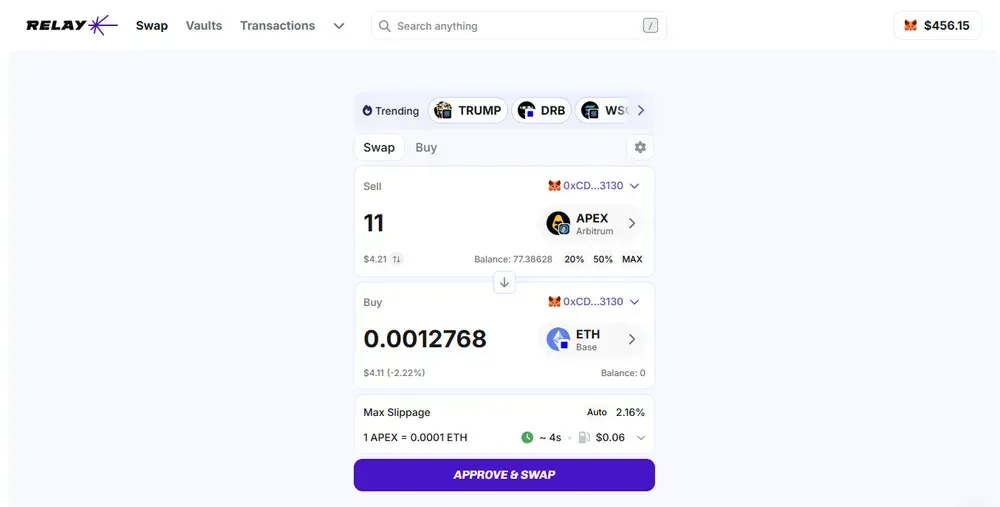
5. Rango Exchange
Rango Exchange is a powerful super-aggregator that combines decentralized exchanges and bridges into a unified routing engine. We utilized its any-to-any swap feature to move assets between ecosystems like Bitcoin, Solana, and Cosmos with high reliability.
The protocol functions by scanning over 120 liquidity sources to find the most cost-effective path for multi-step trades. During our evaluation, we found the interface simplifies complex transactions by automatically handling the technical logic of swapping and bridging.
Our research confirms that Rango is a preferred backend provider for major wallets like Trust Wallet and MetaMask. We appreciated the specialized routing modes that prioritize either the lowest fees or the fastest transaction times for users.
Pros
- Unmatched reach across 70+ chains, including non-EVM networks like Bitcoin and TON.
- Aggregates both DEXs and bridges to ensure the best possible price for any asset pair.
- Integrated into top-tier wallets, providing a high level of technical reliability and trust.
Cons
- Multi-step routes can sometimes lead to "dust" remnants on intermediate blockchains.
- Complex paths may result in longer transaction times compared to direct bridges.
- Interface can feel overwhelming for beginners due to the high volume of routing data.
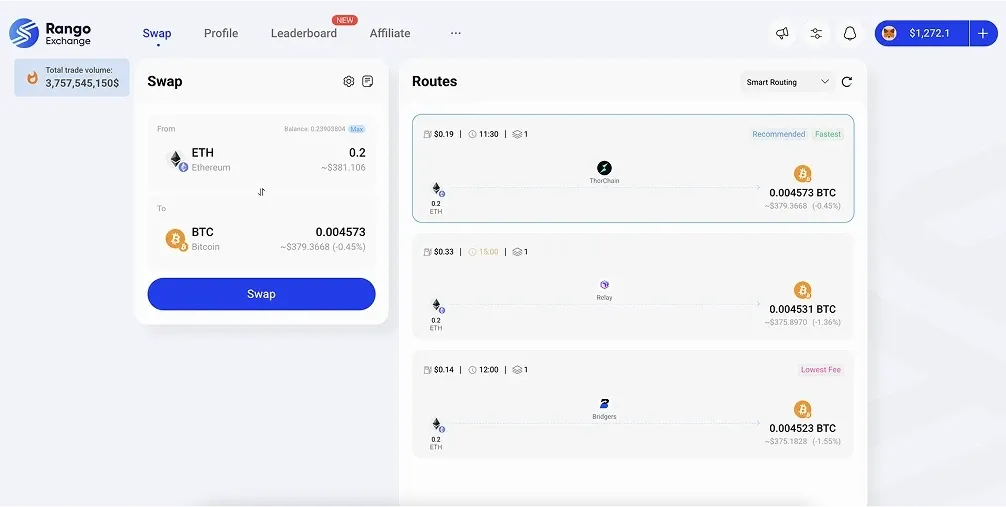
6. Stargate
As one of the oldest cross-chain protocols, Stargate utilizes the LayerZero V2 messaging framework to maintain unified liquidity pools. We checked its V2 Bus mode, which batches multiple transfers together to slash gas costs by nearly 90%.
The protocol specializes in native-to-native swaps without utilizing risky wrapped assets or middle-chain validation. During our 2026 evaluation, we found the Hydra mint-and-burn mechanism highly effective for moving stablecoins into emerging ecosystems that lack deep native pool depth.
Our review confirms that Stargate provides guaranteed finality through its off-chain AI Planning Module. We appreciated the choice between Taxi and Bus modes, allowing us to prioritize either immediate settlement speed or cost efficiency depending on the transaction size.
Pros
- Provides instant guaranteed finality for native-to-native asset transfers.
- Hydra mechanism enables deep stablecoin liquidity on emerging blockchains.
- V2 Bus mode dramatically reduces individual user messaging costs.
Cons
- Bridging times are slower compared to high-speed intent-based relayers.
- Interface lacks advanced features found in specialized DEX aggregators.
- Liquidity fragmentation can occur across pools despite Delta algorithm updates.
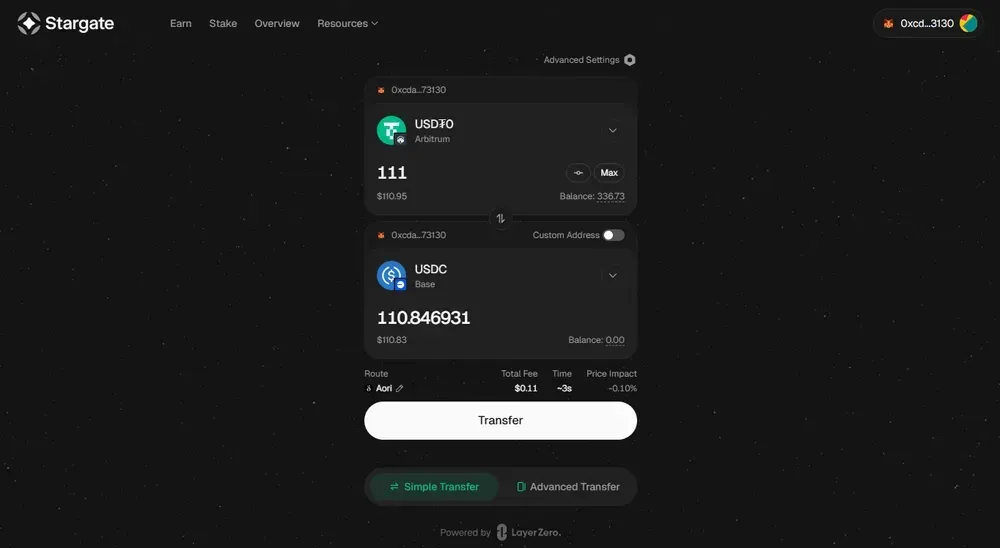
7. Meson
Great for stablecoin efficiency, Meson Finance utilizes a unique Hash Time Lock Contract mechanism for atomic swaps. We transferred USDC across 60 networks during our 2026 tests, finding that peer-to-peer liquidity matching effectively eliminates traditional bridge vulnerabilities and oracle risks.
The protocol excels at low-cost, high-velocity transfers by bypassing cross-chain messaging and relayers entirely. We appreciated the Meson Premium feature, which offers zero-service-fee swaps for frequent traders who require consistent liquidity when moving large capital between diverse blockchain ecosystems.
Our testing confirmed that Meson offers specialized direct-from-CEX withdrawal options into various supported chains. We found the atomic nature of the swaps provides high security, ensuring that funds either arrive at the destination or automatically return to the sender's wallet.
Pros
- HTLC atomic swaps provide high security against common bridge exploits.
- Meson Premium allows frequent traders to execute swaps without fees.
- Supports direct stablecoin withdrawals from major centralized exchange accounts.
Cons
- Limited asset support focused exclusively on the major stablecoin pairs.
- Smaller liquidity pools can result in higher slippage for whales.
- Interface lacks advanced yield-earning or DeFi tracking tools for users.
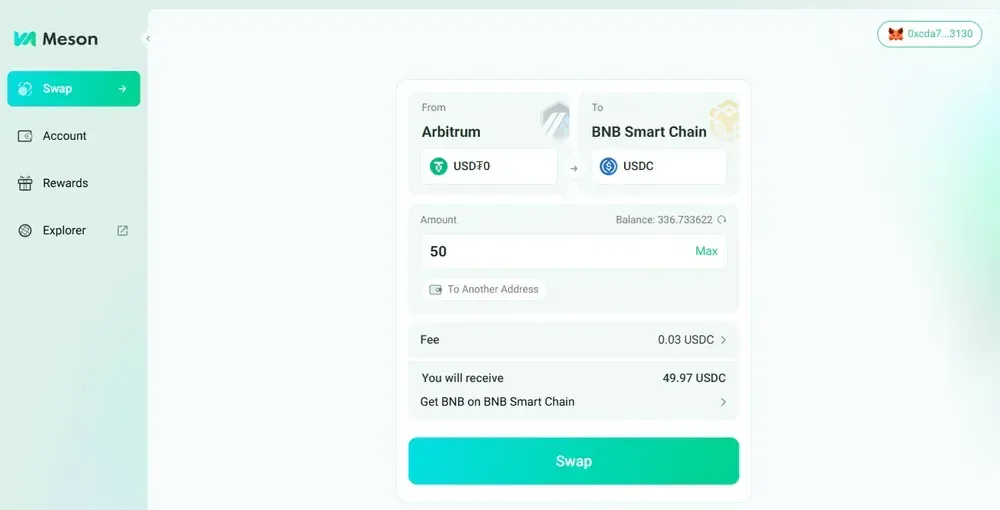
8. Orbiter Finance
Final on our list for cross-chain bridges, Orbiter Finance operates a decentralized maker-sender model optimized for Ethereum rollups. We utilized its ZK-SPV proof system during recent assessment to verify transactions off-chain, ensuring high security without the latency of traditional validators.
The protocol functions as a cross-rollup engine supporting over 70 networks, including specialized environments like TON and Starknet. During our evaluation, we found the 0.03% fee structure highly efficient for moving assets between ZK-rollups where liquidity fragmentation often increases costs.
Our team confirmed that Orbiter’s unique arbitration mechanism protects users by locking maker margins in decentralized contracts. We appreciated how the platform's account abstraction features allow for paying bridge fees in various tokens, simplifying the user experience across diverse ecosystems.
Pros
- Employs ZK-proof arbitration to guarantee safe and decentralized asset transfers.
- Supports nearly 70 networks including non-EVM chains like Solana and TON.
- Low trading fees provide a cost-effective solution for frequent rollup users.
Cons
- Maker-based liquidity model limits the maximum size of individual transfers.
- Focus on rollups results in less coverage for independent Layer 1s.
- Disputes require manual arbitration requests which may delay fund recovery.
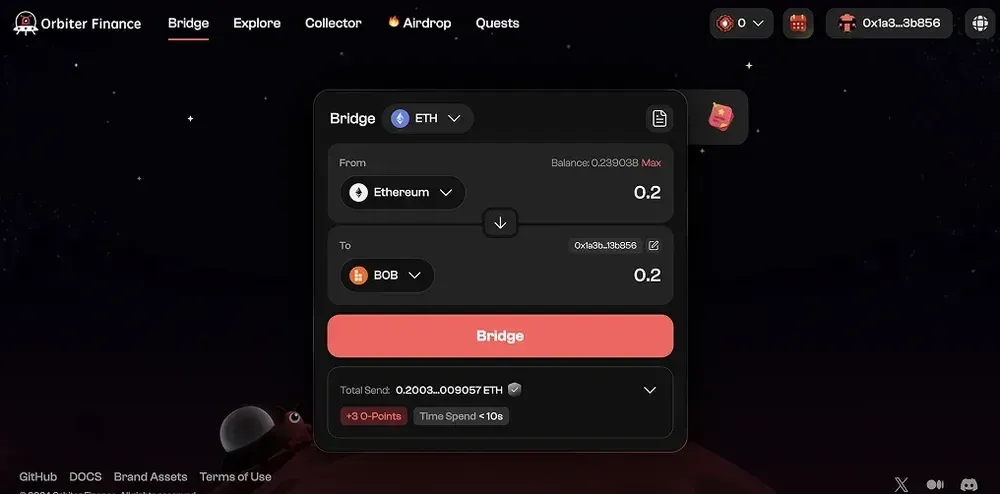
What are Crypto Bridges?
Crypto bridges are specialized protocols that enable the secure transfer of digital assets and data between isolated blockchain networks, facilitating unified liquidity across disconnected ecosystems.
1. Asset Bridges
Asset bridges focus on moving liquidity between networks by locking tokens on a source chain to mint synthetic versions elsewhere. Protocols like Stargate, and Synapse use liquidity pools to ensure users receive native or wrapped assets on their target destination.
These bridges are primarily used for straightforward token transfers where deep liquidity is necessary to prevent slippage. We found that their reliance on pool-based models makes them ideal for large stablecoin moves, though they often require significant capital to maintain efficiency.
2. Protocol Bridges
Protocol bridges are specialized onboarding rails that serve specific decentralized applications, particularly high-performance perpetual exchanges. Hyperliquid and Lighter use these dedicated tunnels to move collateral from external networks directly into their custom trading environments.
These bridges are used almost exclusively to fund specific trading accounts with minimal latency and high security. We found that these native gateways are the most reliable way to deposit USDC, as they are hard-coded into the exchange's core logic to ensure effortless settlement.
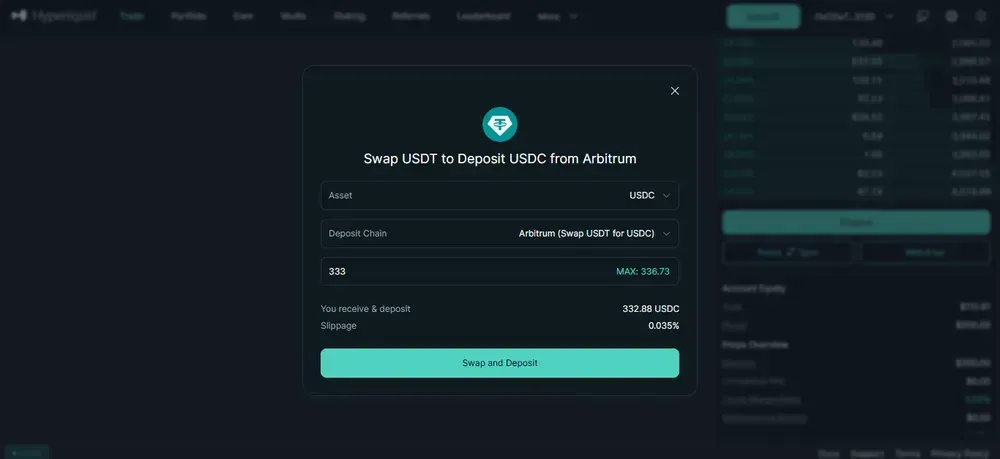
3. Intent-Based Messaging Bridges
Intent-based bridges shift the execution risk from the user to a network of professional solvers who compete to fill orders. deBridge, Across, and Relay allow users to specify a desired outcome while solvers fulfill the trade instantly using their own capital.
This category is used for high-velocity transfers where speed is the priority over protocol-level finality. We noticed that by using intents, these bridges eliminate the need for traditional messaging wait times, making them the fastest option for retail users.
4. Data Bridges
Data bridges provide a foundational messaging layer that allows smart contracts to communicate arbitrary information across different chains. Wormhole, LayerZero, and Chainlink CCIP utilize decentralized verifier networks to sign and broadcast cross-chain messages with high security.
These protocols are used for building omnichain applications where governance votes or contract state must be synchronized globally. We found that data bridges are the most versatile option, as they support everything from token transfers to complex remote calls.
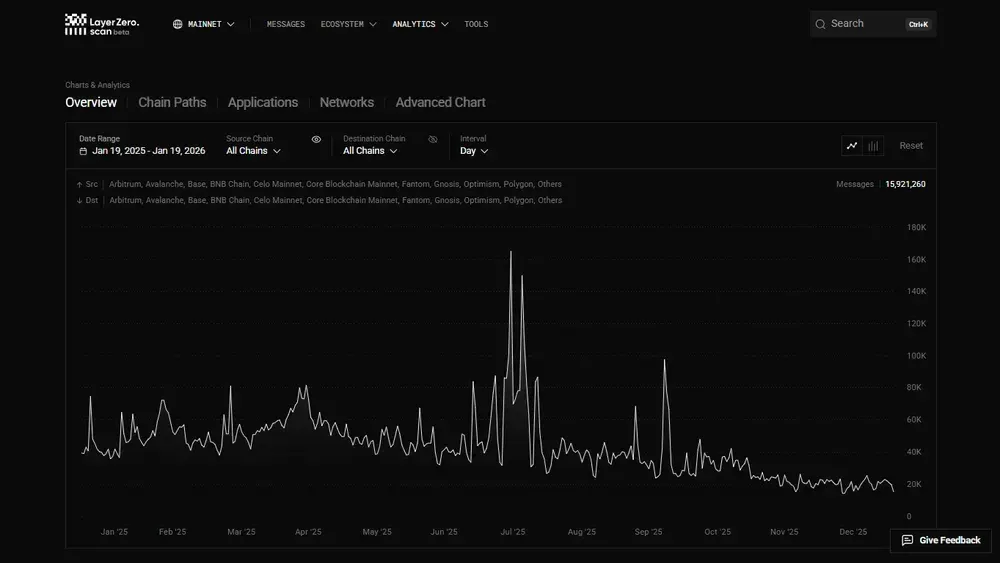
5. Rollup-Specific Bridges
Rollup-specific bridges are highly optimized for moving assets between Ethereum and its various Layer 2 scaling solutions. Orbiter Finance, Hop Protocol, Rhino.fi, and Owlto focus on low-latency transfers by utilizing specialized witness nodes and recursive proofs to verify transactions.
Users choose these bridges to avoid the high gas costs and delays associated with native rollup exits. Our testing shows that these platforms are indispensable for navigating the "Superchain" and ZK-ecosystems, providing the most cost-effective entry points available.
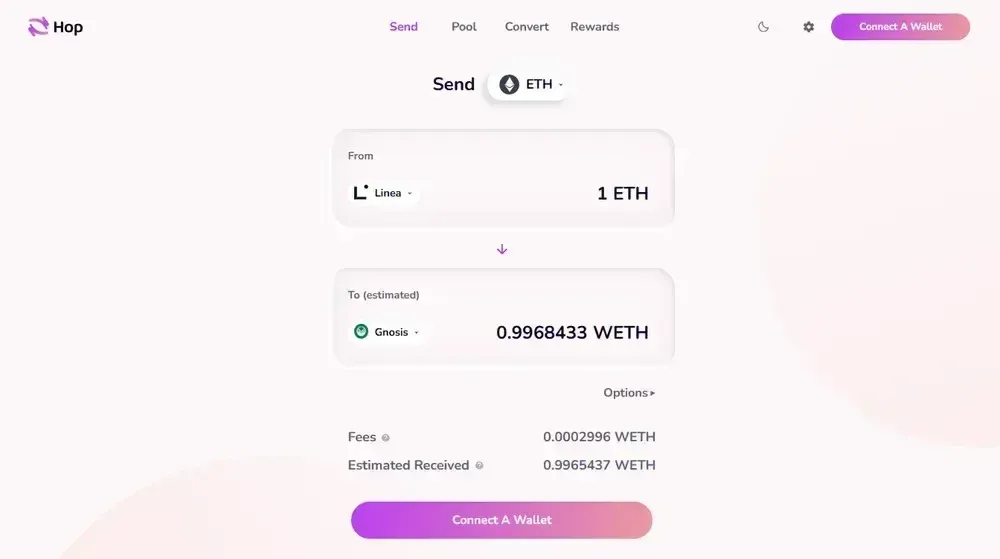
Pros and Cons of Crypto Bridges
Cross-chain bridges are essential for liquidity but introduce specific trade-offs between speed, cost, and security. Understanding these factors is vital for getting around the 2026 multi-chain climate.
How to Choose a Crypto Bridge
Selecting a crypto bridge is a process of verifying network support, auditing security, and comparing costs to ensure assets arrive safely at their destination.
Step 1: Verify Network Support
The first step is confirming the bridge supports both your origin and destination chains while handling the specific tokens you intend to transfer.
- Check if the bridge links your current chain to your destination.
- Confirm the protocol supports the specific asset you want to move.
- Verify support for non-EVM chains like Solana or the TON network.
- Use Relay if you need access to over eighty different networks.
Step 2: Audit Security and Reputation
Evaluating security is vital for protecting capital from exploits by checking for third-party audits and active bug bounties on major security platforms.
- Look for audits from top firms like Spearbit or OpenZeppelin.
- Check for active bug bounties exceeding $1 million on Immunefi.
- Research the history of exploit recovery for bridges like Wormhole.
- Ensure the bridge uses decentralized verifiers rather than a simple multisig.
Step 3: Compare Total Transaction Costs
Total costs include protocol fees, gas expenses, and price slippage which vary significantly between intent-based solvers and traditional liquidity pool models.
- Compare deBridge's flat fees against percentage-based costs on Across Protocol.
- Estimate slippage differences between Stargate's pools and Meson's atomic swaps.
- Calculate destination gas costs across different Layer 2 and Layer 1 networks.
- Use aggregators like LI.FI to find the most efficient routing path.
Step 4: Assess Liquidity and Finality
Assessing finality and liquidity is necessary to prevent failed transactions or high price impact when moving assets between different blockchain environments.
- Evaluate sub-second speeds offered by intent-based models like deBridge or Relay.
- Monitor destination pool depth to avoid excessive slippage on your transfer.
- Compare settlement times of ZK-rollups against traditional optimistic bridge routes.
- Verify the bridge handles native assets rather than risky wrapped tokens.
Step 5: Run a Test Transaction
Executing a small transfer is the safest way to confirm the route is active and your wallet is correctly configured for delivery.
- Send a small test amount to verify the bridge's active status.
- Confirm the destination token contract address matches the official asset profile.
- Monitor the end-to-end time to ensure it meets your specific needs.
- Ensure your wallet holds enough native gas for any required claims.
How to Bridge Crypto Assets: ETH to Base Example
Here's a quick six-step walkthrough illustrating how simple it is to bridge crypto assets between chains. For this example, we’re using deBridge, a trusted cross-chain protocol known for instant settlements.
Follow these six steps to complete your cross-chain transfer.
- Visit Protocol Website - Go to the official deBridge application and verify the URL to protect your wallet from phishing attempts or malicious clones.
- Connect Active Wallet - Link your MetaMask or Phantom wallet by selecting the connect button and approving the permission request within your browser extension.
- Select Chain Pair - Choose Ethereum as your source network and Base as the destination to ensure the protocol routes your ETH correctly.
- Enter Transfer Amount - Input the total ETH you want to bridge, ensuring you leave enough native currency to cover the initial gas costs.
- Review Fee Quote - Check the estimated gas fees and delivery time before proceeding to ensure the transaction fits your specific budget and timeframe.
- Confirm Final Transaction - Click the bridge button and sign the signature request in your wallet to initiate the atomic swap and fund delivery.
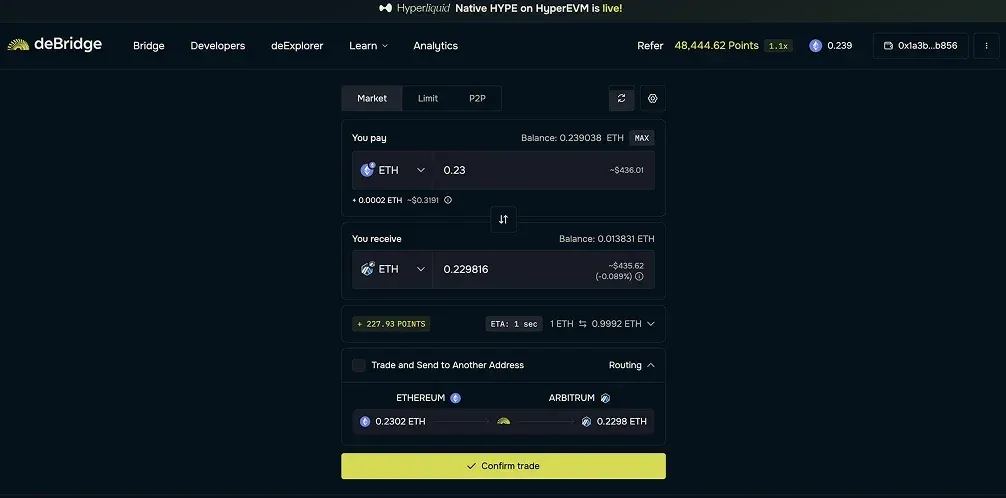
Cryptocurrency Bridges Regulations
The European Union’s Markets in Crypto-Assets (MiCA) regulation now dictates strict licensing for bridge operators acting as service providers. By July 2026, the grace period for existing firms ends, requiring full authorization to facilitate cross-border asset transfers within the single market.
In the United States, the GENIUS Act mandates that bridge-connected stablecoin issuers maintain one-to-one liquid reserves. The Treasury Department’s FinCEN monitors these protocols under expanded Travel Rule requirements to identify chain-hopping illicit flows across high-velocity decentralized infrastructure.
The UK’s Financial Conduct Authority opens its authorization gateway in late 2026 to regulate bridges handling stablecoins and staking services. This regime forces non-UK entities to establish local subsidiaries or follow strict transparency standards before the final 2027 enforcement deadline.
Are Crypto Bridges Safe?
Crypto bridges are high-risk protocols and represent one of the most targeted sectors in the decentralized finance ecosystem. As of early 2026, cumulative bridge-related hack losses exceed $2.8 billion, with total cryptocurrency theft reaching $3.4 billion in 2025 alone.
- Ronin Network ($625 million): A 2022 exploit involving compromised private keys allowed attackers to drain ETH and USDC from Axie Infinity's sidechain.
- BNB Bridge ($570 million): Hackers exploited a vulnerability in the BSC Token Hub's proof verifier to mint two million additional BNB tokens.
- Wormhole ($325 million): An attacker bypassed signature verification by exploiting a deprecated code function, allowing them to mint wrapped ETH on Solana.
- Nomad Bridge ($190 million): A misconfiguration in trusted roots allowed users to copy-paste transaction data to drain nearly all funds from the bridge.
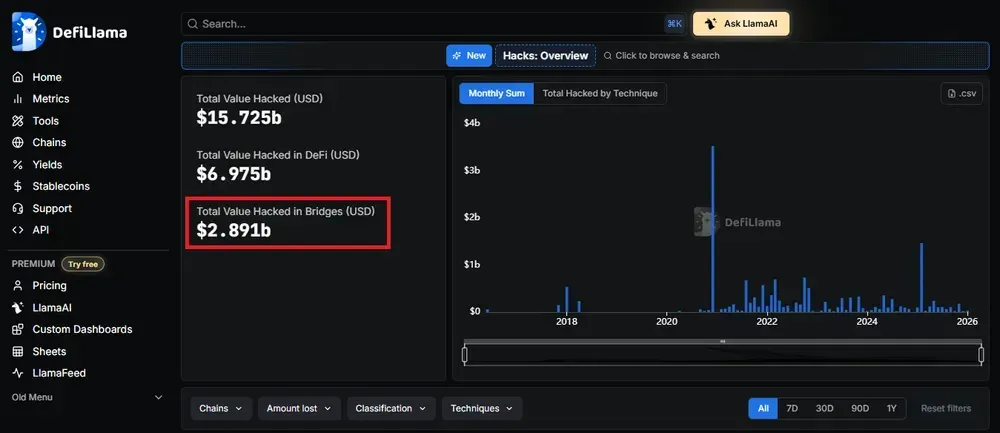
Tips for Safe Cross-Chain Bridging
Safe bridging requires a combination of protocol due diligence and strict wallet management to minimize exposure to smart contract risks and phishing.
Essential practices for protecting your assets during transfers:
- Check Audits: Only use bridges with recent security audits from high-tier firms like OpenZeppelin to verify the protocol's underlying code safety.
- Use Aggregators: Utilize platforms like LI.FI to compare real-time security scores and routing options across various providers before committing your capital.
- Monitor TVL: Verify that the bridge maintains high Total Value Locked, as low liquidity frequently results in failed transactions or slippage.
- Set Limits: Establish a personal maximum transfer amount per transaction to cap potential losses during an unexpected or sudden protocol exploit.
- Revoke Approvals: Regularly use tools like Revoke.cash to cancel unlimited token permissions granted to bridges once your cross-chain transfer is complete.
- Verify Links: Always navigate to bridge interfaces via official project documentation to avoid phishing sites that drain wallets through malicious signatures.
- Test First: Execute a small $10 transfer to confirm the bridge route is active and your destination wallet correctly receives funds.
Final Thoughts
Crypto bridges are the indispensable infrastructure allowing the decentralized economy to scale effectively across 50 different high-performance blockchain networks.
Selecting a secure provider requires balancing transaction speed and cost against the inherent technical risks of moving assets between diverse and dispersed ecosystems.
Our top eight protocol picks represent the most reliable options available for navigating the complex cross-chain environment with high efficiency and maximum confidence.
Frequently asked questions
Intent vs Lock & Burn Bridges: What's the Difference?
Lock-and-burn bridges transfer tokens by locking assets on one chain and minting equivalents on another, relying on liquidity pools. Intent-based bridges use off-chain relayers to fulfill transactions instantly, eliminating liquidity lock-ups, lowering risk, and speeding up transfers.
How do wrapped tokens work and are they safe?
Wrapped tokens bridge cryptocurrencies by locking assets on one chain and minting equivalent tokens on another. This method boosts cross-chain liquidity and interoperability. While typically secure, vulnerabilities emerge if asset custody or minting mechanisms are compromised.
How Long Does Crypto Bridging Usually Take?
Crypto bridging typically takes anywhere from a few seconds to several hours, depending on factors like blockchain traffic, bridge design, confirmation speeds, and the specific networks involved. Modern bridges often settle transactions rapidly, but older protocols can face delays.
Can Crypto Bridging Trigger a Taxable Event?
Generally, bridging crypto between blockchains isn't taxable, as you're not disposing of assets. However, if bridging involves token swaps, conversions, or results in rewards or incentives, these could trigger tax liabilities. Always consult local tax guidelines.

Written by
Antony Bianco
Head of Research
Antony Bianco, co-founder of Datawallet, is a DeFi expert and active member of the Ethereum community who assist in zero-knowledge proof research for layer 2's. With a Master’s in Computer Science, he has made significant contributions to the crypto ecosystem, working with various DAOs on-chain.
.svg)
